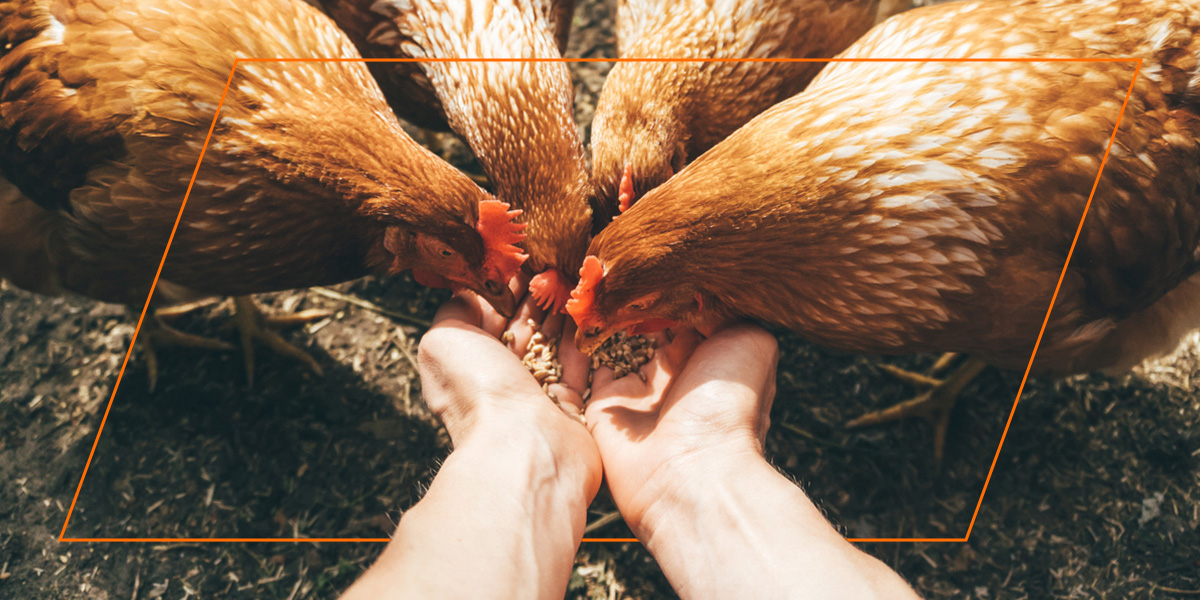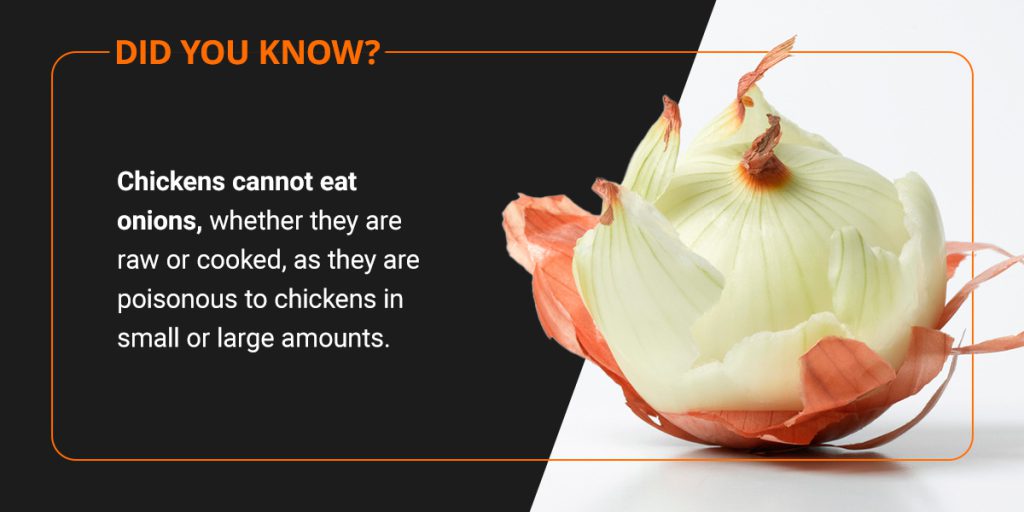
What Chickens Can and Can’t Eat
You want your chickens to be happy and healthy. You know that natural, whole foods are good for them, but you also know that chickens will eat almost anything. So what can and should chickens eat?
What Do Chickens Eat?
A free-ranging bird will find its own forage, especially in warmer months. During winter, and for flocks without yard access, you’ll want to provide nutritional chicken feed. With scientifically proven options like Nature’s Best Organic Feeds®, you can make sure all of your chickens’ basic needs are met. Once you set your flock up for success, you can use healthy, whole foods to supplement their diet.
What Can’t Chickens Eat?
While chickens generally love most scraps from your kitchen, it’s important to familiarize yourself with the items you should avoid entirely. Check out our “What Chickens Can’t Eat” list.
1. Chocolate and Caffeine
Some food and drink items clearly don’t belong in the chicken coop, such as alcohol, chocolate, and caffeine. Chocolate and candy products often contain theobromine and caffeine, which can be extremely dangerous for animals. This chemical can cause vomiting, seizures, diarrhea and death in your chickens.
2. Processed Foods
Foods that aren’t good for humans are usually poor choices for chickens, so keep your birds away from processed foods. These items are loaded with sugar and salt, leading to obesity and electrolyte imbalances. Too much salt can cause dehydration and heart failure, so it’s best to avoid foods like pretzels and potato chips.
3. Rotten Food
Your chickens can get very sick from eating spoiled food, which can be toxic and cause digestive issues. Mold can also be deadly, so chickens should never be given spoiled food. If you wouldn’t eat it, your birds shouldn’t either.
4. Leafy Greens and Plants
Some leafy vegetation can also pose a danger to your birds. Tomatoes, peppers, and potatoes are members of the nightshade family, so their leaves are toxic to many animals. Tomatoes and peppers are safe for your chickens to eat as long as the leaves are fully removed. Raw and green potatoes can carry solanine and chaconine in their skins. These toxins can wreak havoc on your chicken’s digestive system and cause vomiting and diarrhea. Though the potato flesh is safe, chickens shouldn’t be fed raw or green peelings.
Rhubarb leaves are particularly dangerous for chickens as they contain oxalic acid. This can disrupt calcium absorption and cause kidney failure or death in chickens. Ornamental plants and seedpods, including wisteria, lily of the valley, daffodils, and burdock, can also be toxic to chickens.
5. Eggs
Some chickens will eat their own eggs if left to their own devices or if they break in the coop. However, feeding your chickens raw or cooked eggs can cause them to develop an acquired taste, which can be a hard habit to break. You can feed them dried, crushed eggshells for extra calcium and nutrients they lose when they lay eggs.
What Can You Feed Your Chickens?
Chickens are commonly known for eating just about anything, but there are some restrictions to keep in mind.
1. Can Chickens Eat Tomatoes?
Absolutely! Chickens love this healthy snack. Packed with vitamins, fiber, and antioxidants, tomatoes make a great chicken treat. Just don’t let them eat the leaves or flowers. Most free-range birds know better — and would rather steal a yummy tomato off the vine — but you might consider fencing off tomato plants to protect your chickens.
2. Can Chickens Eat Citrus Fruits?
Sometimes. Citrus fruits like lemons, limes, oranges, and grapefruits contain high levels of acidity, which can affect calcium absorption. Citrus fruits may also cause irritation in the digestive tract. In some cases, too much citric acid can lead to decreased egg production and thinner shells. It’s best to feed these treats sparingly to your flock.
3. Can Chickens Eat Peppers?
Yes. Like tomatoes, pepper plants are a healthy fruit. Chickens usually feel less enthusiastic about peppers.
4. Can Chickens Eat Carrots?
Yes. Carrots are full of nutrients and can be served raw or cooked. The greens are also healthy but should be chopped for easy eating. Stick with fresh carrots, as the canned variety is high in salt.
5. Can Chickens Eat Cucumbers?
Yes. Cucumbers are an excellent chicken snack. Loaded with vitamins, minerals, and fiber, these water-rich veggies make especially good treats during hot summers. Chickens can eat the cucumber skin as well, but often times they usually just eat the middle flesh of the cucumber.
6. Can Chickens Eat Cilantro?
Yes. This herb is great for building healthy bones and is rich in vitamins and antioxidants.
7. Can Chickens Eat Lettuce?
Sometimes. Lettuce is generally good for your birds, but beware of the iceberg variety. Iceberg lettuce has little nutritional value and can lead to diarrhea. Stick with dark, leafy greens.
8. Can Chickens Eat Cabbage?
Yes. Cabbage is a great example of nutritional roughage for your birds. It can also provide entertainment. Tied on a line or packed in a container with holes, chickens can peck at cabbage for hours.
9. Can Chickens Eat Celery?
Sometimes. Celery is rich in folate, fiber, and vitamins K and C. But it can cause digestive issues because it’s so tough and stringy. If you’re going to feed chickens celery, cut it into small, manageable pieces.
10. Can Chickens Eat Onions?

No. Chickens cannot eat onions, whether they are raw or cooked, as they are poisonous to chickens in small or large amounts. Onions contain sulfur compounds that decompose into oxidizing agents that can cause anemia in your chickens.
11. Can Chickens Eat Rice?
Sometimes. While birds and chickens can technically eat rice, raw rice can cause blockages in their digestive tract. Avoid feeding your chickens uncooked rice because of its high level of undigestible starch. Cooked rice may be safe in moderation as long as it doesn’t contain any added salt.
12. Can Chickens Eat Pineapple?
Sometimes. Pineapples are generally safe for chickens to eat and offer many vitamins and nutrients like calcium, potassium, and vitamins B and C. However, they should be fed in moderation due to their sugar and acidic content. Like citrus fruits, large amounts of pineapple can irritate the stomach and digestive tract.
Be sure to remove the hard pineapple skin and leaves first, as chickens can only eat the flesh.
13. Can Chickens Eat Blackberries?
Yes. Chickens generally love all sorts of berries. These tasty treats are high in vitamin C and antioxidants.
14. Can Chickens Eat Blueberries?
Yes. Chickens love these healthy berries that are rich in fiber and vitamins C and K. You may see some unusual poop colors after this treat!
15. Can Chickens Eat Raspberries?
Yes. Raspberries are another favorite for poultry. Raspberries contain vitamins, minerals, and antioxidants that provide healthy nutrients to chickens.
16. Can Chickens Eat Pears?
Yes. Pears are healthy and low in sugar, although not always a chicken’s first choice. Avoid feeding your chickens pear seeds as they are harsh, bitter, and can contain small traces of cyanide, which can result in poisoning.
17. Can Chickens Eat Grapes?
Sometimes. Since they’re high in sugar, grapes should be fed in moderation. Stick with the seedless variety and chop them up to aid digestion.
18. Can Chickens Eat Apples?
Yes. Apples are a healthy snack. They should be chopped and cored when used for chicken treats. Since apple seeds contain traces of amygdalin, which can release cyanide once digested. It’s best to try to remove apple seeds first, as large quantities can be very harmful. As an apple alternative, chickens can also eat applesauce.
19. Can Chickens Eat Peaches?
Yes. Chickens love this nutritious fruit. The pit contains some cyanide, so remove the pit first.
20. Can Chickens Eat Avocados?
Avocado flesh, skin and pits contain persin, a harmful toxin that can cause vomiting and diarrhea in your chickens.
21. Can Chickens Eat Cashews?
Yes. Small, chopped pieces of unsalted cashews provide great healthy fats and protein. Be sure to remove the shells before feeding.
22. Can Chickens Eat Popcorn?
Yes. Plain, unsalted, unbuttered popcorn is a vitamin and fiber-rich chicken snack. Flavoring or seasonings of any kind should be avoided. Unpopped popcorn kernels can present a choking hazard and may be difficult for your chickens to digest, so it’s best to only offer popped popcorn.
23. Can Chickens Eat Cheese?
Sometimes. Cheese can be a good source of healthy fats, protein, and calcium in moderation. Certain types of cheese, like cheddar, parmesan, and gouda, offer higher amounts of fortified probiotic bacteria, which can offer immune support. Feed only small portions of cheese since too many dairy products can lead to weight gain in your chickens.
24. Can Chickens Eat Bread?
Sometimes. Chickens love bread, but it has low nutritional content. Bread for chickens is similar to junk food for humans, meaning it’s tasty, but not ideal. Feed this treat sparingly.
Give Your Birds the Best With Nature’s Best Organic Feeds
The cornerstone of a strong flock is nutrition. There are plenty of natural, wholesome treats to supplement your chickens’ diet, and you want the core of that diet to be healthy, too.
Nature’s Best Organic Feeds are scientifically tested, non-medicated, and non-GMO. With seven products covering chicks, layers, and more, every bag is certified organic and created with one goal in mind — to help you build a healthy, productive flock.
Visit your local Tractor Supply Co. and give your chickens Nature’s Best!
